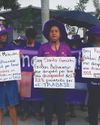In the palm of my hand, I delicately finger a pair of unfamiliar ID cards printed on worn pieces of coloured paper, yellow and salmon pink. The faded type reveals they were issued in the spring of 1941 with approval from the Royal Canadian Mounted Police.

The yellow marks my great-grandmother as a Japanese National and the pink indicates my great-grandfather was a naturalized Canadian. Between my thumb and index finger, I clasp these rare and coveted discoveries: names, addresses, heights, weights, occupations, and even marks of identification on their bodies. I practise saying my ancestors’ names aloud, slowly, so I do not forget, but I have never learned to speak Japanese and am self-conscious about my pronunciation. I realize there is a third colour of these cards – white – that I am missing. White was only assigned to those who were born in Canada.
Today, I will start building a sculpture out of hundreds of replicated registration cards from the Second World War. The sculpture will represent over 8,000 Japanese-Canadian people, including my oba-chan and her family, who were taken from their homes in coastal B.C. and detained in the stables and exhibition buildings at Hastings Park in East Vancouver. I grew up eating mini-doughnuts at the PNE Fair in Hastings Park during my childhood summers, but nobody in my family spoke about this history. I don’t know if they even knew.
I have made copies of the real ones my oba-chan left behind after she died. These registration cards identified her parents, my great-grandparents, who were 49 and 59 years old, respectively, when the war broke out. I found the cards in an old box of her things in a closet at my parents’ house: tucked in her fake snakeskin wallet, among my grandpa’s funeral papers and an album filled halfway with fading Fujifilm photos from the ’80s. Photos taken when my grandparents returned to British Columbia, after they fled Montreal in the ’70s. They’d lived in Montreal after the war had ended, when they were not allowed to return to the West Coast.
Denne historien er fra March/April 2019-utgaven av Briarpatch.
Start din 7-dagers gratis prøveperiode på Magzter GOLD for å få tilgang til tusenvis av utvalgte premiumhistorier og 9000+ magasiner og aviser.
Allerede abonnent ? Logg på
Denne historien er fra March/April 2019-utgaven av Briarpatch.
Start din 7-dagers gratis prøveperiode på Magzter GOLD for å få tilgang til tusenvis av utvalgte premiumhistorier og 9000+ magasiner og aviser.
Allerede abonnent? Logg på

PLATFORMS FOR PEOPLE, NOT PROFIT
Digital platforms boast that they’ve “democratized” cultural production. But what would truly democratic platforms look like in Canada?

ORGANIZING THROUGH LOSS IN THE HEART OF OIL COUNTRY
The story of climate justice organizing in Alberta, at the heart of the tarsands, is the story of a group of young activists learning what it means to lose, and keep on fighting

GROWING THE LABOUR MOVEMENT
How unions are using community gardens to engage members, nourish communities, and help strikers weather the picket line

A NEW ERA FOR OLD CROW
In the Yukon’s northernmost community, the Vuntut Gwitchin First Nation is reckoning with how to preserve their land and culture, amid a warming climate and an influx of tourists

“At Least Hookers Get Wages”
The risky business of sex work in the gig economy

The Literal – And Literary – Futures We Build
Briarpatch editor Saima Desai talks to two judges of our Writing in the Margins contest about Idle No More and MMIWG, ethical kinship, writing queer sex, and their forthcoming work.

The Cost Of A T-Shirt
In Honduras, women maquila workers are fighting back against the multinational garment companies that they say are endangering their health and safety.

Milking Prison Labour
Canada’s prison farms are being reopened. But when prisoners will be paid pennies a day, and the fruits of their labour will likely be exported for profit, there’s little to celebrate.

Bringing Back The Beat
In mainstream media, labour journalism has been replaced by financial reporting and business sections. But journalism students are raising the labour beat from the grave.

There's No Journalism On A Dead Planet
Corporate media owners are killing local newspapers – which is making it impossible for everyday people to understand the on-the-ground impacts of the climate crisis